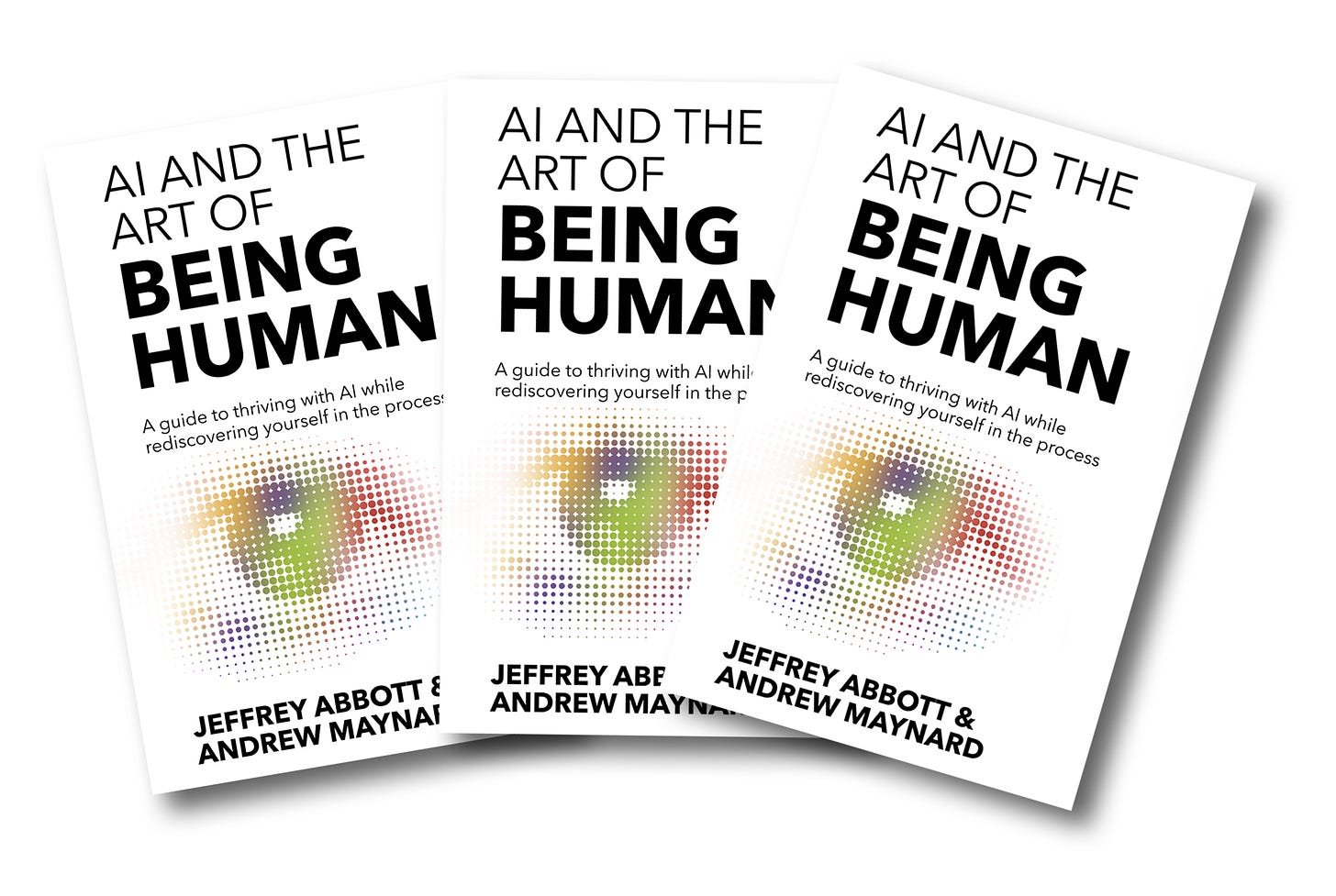Should you read AI and the Art of Being Human?
After all, what could possibly go wrong as AI gets increasingly good at doing you?
The thing I perhaps dread most in life is having to write a skin-crawlingly puffed-up promo piece for my academic performance review each year.
And the second is writing a skin-crawlingly puffed-up promo piece for a new book release.
Which is unfortunate, as I find myself faced with doing precisely this with the formal launch today of the new book AI and the Art of Being Human.
I may be exaggerating just a bit here.1 But the reality is that, despite writing being integral to who I am, writing about stuff I’ve done and why people should care about it makes me feel more of a self-aggrandizing fraud with each miserable draft that emerges.
And so this time round with the book launch I’ve decided to ditch convention, blow the consequences, and write what I want rather than what I probably should.
So here goes:
First, do not read this book unless you want to—life’s too short!
But if you do decide to check it out, you may find the following useful:
The first thing, being really practical here, is that you can purchase AI and the Art of Being Human most places you get your books. The bad news is that Amazon messed up the listings so you may need to wait a day or so for the hardback and paperback versions (they’re available elsewhere). However the Kindle version is there for the taking (metaphorically speaking).
And just to make things easier, the Kindle version of the book (and other digital versions elsewhere) is temporarily available for the discounted price of $0.99 (or equivalent outside the US)—just for the next week (it’s normally $9.99).2
This means that, for each 60 books sold, Jeff and I will be able to stretch to a decent cup of coffee. But we’re optimistically hoping that a wave of enthusiastic purchases will support our caffeine habits for the next few days.
More seriously, this is a book that we both believe is timely and important—it’s why we wrote it. It tackles big questions around what makes us us in ways that are clear and engaging, at a time when AI is seriously challenging our individual and collective identities. And it’s a book that provides practical ways to rediscover yourself the process while embracing AI in meaningful ways.3
If this is something that you also think is timely and important, great. If not, this is probably not the book for you.
Next, the book is not academic, intellectual, “clever,” preachy, or wedded to a particular ideology (unless you count believing that caring for yourself, others, and the future we’re creating together, is important).
On the other hand, it is readable, understandable, and practical.
I realize that these are not winning traits in a best-seller. On the other hand, I’d rather be associated with something that’s genuinely useful than something that’s merely trendy.
The next one could be a deal-breaker for some readers: In the book we very intentionally use fictional narratives to reveal possibilities and develop tools.
It’s an approach that will be very familiar to anyone involved in futures work. It’s also a powerful way of enabling readers to see themselves in the book that transcends what’s possible with real-life stories—especially when those stories are still emerging.4
If that’s not your jam, you probably won’t want to start reading the book. Especially as it may severely challenge your assumptions around the power of stories in preparing for unpredictable futures.
Finally, the book is 362 pages long. I know that this may seem like a rather random fact. But I hear that people’s attention span is on the decline, so this may be a deciding factor in whether someone is bothered to explore the art of being human in an age of AI, or not.
With the (temporarily) discounted digital price of $0.99 I’m almost embarrassed to say this, but if you are still unsure about the book and want to give it a test-run, you can download the first 50 pages for free at aiandtheartofbeinghuman.com. Needless to say, this does not support my nor Jeff’s coffee habit in the slightest. But that’s OK.
All joking aside, do check out the book. It may not be perfect, or to everyone’s taste. But both Jeff and I believe that artificial intelligence is opening up possibilities to better-understand what makes us us in ways that few other technology have, and that embarking on the journey we lay out in AI and the Art of Being Human is critical to learning to thrive with AI, rather than being diminished by it—whoever you and and whatever you do.
Not as much as you might imagine though. I can feel my anxiety levels rising at the mere thought of next year’s annual review!
Apologies if you’re reading this after discount period!
Importantly, the book is not for or agains AI, but is pro human in an AI-infused world. It’s a book that sets out to help you think, rather than telling you what to think.
We talk more about why we chose the narrative approach we did in the book’s prelude.



Well, this has been an absolutely refreshing experience to read! Thank you both for this must read!
Thank you for reminding us that authenticity still beats algorithmic optimization, even in book launches! Ordering now. Purely of my own free will, of course.